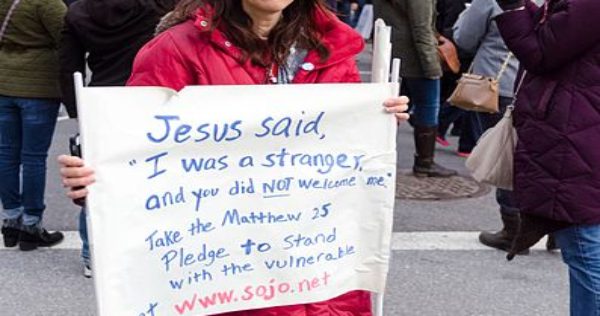Today we are pleas ed to welcome a new contributor to the Anxious Bench, Melissa Borja. A specialist in Asian American studies, religion, and migration, Melissa is an assistant professor at the University of Michigan in the American Culture program. Her first book, Follow the New Way: Hmong Refugee Resettlement and Practice of American Religious Pluralism, “explores the religious dimensions of American refugee care—how governments have expanded capacity through partnerships with religious organizations and how refugee policies have shaped the religious lives of refugees,” and is under contract with Harvard University Press.
ed to welcome a new contributor to the Anxious Bench, Melissa Borja. A specialist in Asian American studies, religion, and migration, Melissa is an assistant professor at the University of Michigan in the American Culture program. Her first book, Follow the New Way: Hmong Refugee Resettlement and Practice of American Religious Pluralism, “explores the religious dimensions of American refugee care—how governments have expanded capacity through partnerships with religious organizations and how refugee policies have shaped the religious lives of refugees,” and is under contract with Harvard University Press.
Another showdown over immigration is in the works in Congress, where members of the House are preparing to vote on two immigration measures next week. After months of failed efforts to find a legislative compromise on the future of the Deferred Action for Childhood Arrivals (DACA) program, it’s possible that things will turn out differently this time around. Public outrage about U.S. immigration policies is at a high, especially after revelations that the U.S. government been systematically splitting up asylum-seeking families at the border and driving parents to such despair that at least one man committed suicide after being separated from his wife and child. The pressure for reform is mounting, domestically and internationally, and even the United Nations criticized the United States for violating migrants’ human rights.
And yet I’m not optimistic about the upcoming vote. Even if political conditions offer a new opening for lawmakers to carefully craft a legislative compromise on DACA, many of the central issues in the broader debate about immigration policy remain unresolved. As politicians campaign for the upcoming midterm elections, they are deploying familiar rhetoric—promises to “stop illegals from taking our jobs” and to “build the wall”—that rally voters, but also set lawmakers up for failure by obscuring the complex reality of immigration. To be sure, there are countless reasons why well-intentioned bipartisan efforts to enact meaningful immigration reform have floundered in the past two decades. However, one fundamental problem is lawmakers’ tendency to debate immigration reform on narrow terms—terms that are based on an insufficient (even faulty) understanding of immigration policy and that, in my view, constrain their ability to imagine a way forward.
The truth is that lawmakers aren’t the only ones who are guilty of this offense; religious people—even those who are most sympathetic to immigrants and refugees—are guilty of this, too. On this point, I call attention to a common refrain in faith-based immigrant justice work: the call to “welcome the stranger.” This language is popular among Christian activists who advocate for more just and generous policies for refugees and immigrants, especially unauthorized immigrants. However, framing immigration justice work as “welcoming the stranger” is part of the problem. It perpetuates the deeply flawed and deleterious assumption that immigrants and refugees are “strangers,” when in fact many unauthorized immigrants and refugees are anything but strangers to America.

For at least half a century, Christian activists in the United States have framed the work of helping immigrants and refugees as an act of hospitality toward “the stranger.” Often drawing on Biblical passages—Leviticus 19 and Matthew 25 are especially popular—Christians across the denominational and theological spectrum have used “welcoming the stranger” as a rallying cry to welcome and aid a wide range of people. In the 1970s, for example, Lutheran Immigration and Refugee Service created a short film titled “Room for a Stranger” to encourage congregations to sponsor Southeast Asian refugees. Several decades later, the Evangelical Immigration Table commissioned their own film, “The Stranger,” about addressing the needs of undocumented Latino immigrants. Today, the Christian appeal to “welcome the stranger” can be found just about everywhere, from Sojourner’s immigration justice campaign to the United States Conference of Catholic Bishops’ pastoral statements.
This language obscures an important fact: refugees and immigrants are not strangers, but people who already have close ties to the United States. For example, refugees historically have been admitted and assisted in part because of their connections to the United States. After the Vietnam War, American military and foreign service officers feared for the safety of their Vietnamese, Lao, and Hmong colleagues left behind in Asia and lobbied for their admission as refugees. Decades later, veterans of the war in Iraq felt a similar sense of loyalty, and they helped Iraqi translators resettle in the United States as refugees. (An Iraqi refugee who had worked with the U.S. government and military was, in fact, one of the first refugees to be detained at John F. Kennedy Airport when President Trump imposed his first travel ban last year.)
The word “stranger” does not accurately describe the millions of undocumented immigrants living in the United States, either. Rather than being “strangers,” undocumented immigrants are community members whom Americans already know, love, and rely on every single day. They are friends, neighbors, classmates, and colleagues who are deeply embedded in American society and essential to Americans’ lives in manifold ways. Well-known are the stories of successful Dreamers who are Pulitzer-prize winning journalists and Princeton-educated scholars. But perhaps more important are those who care for America in humbler, more intimate ways. I’m talking about the undocumented immigrants who grow and cook the food that nourishes Americans’ bodies. (And when they deliver that food, they risk detention.) I’m talking about the undocumented immigrants who care for the elderly and disabled as nurses and home health aides. (Experts worry that without them, nursing homes could be shuttered, leaving the increasingly aging population even more vulnerable.) And I’m also talking about the undocumented immigrants who care for children and perform the reproductive labor of privileged professional women. (“Leaning in” would not be possible without leaning on the work and care of immigrant women.) Ultimately, undocumented immigrants do the work that, to many Americans, is unskilled, menial, degraded labor—and yet it is this work that is most fundamental to human survival.
It is in recognition of this reality that political scientist Joseph Carens has argued for a more humane and just immigration policy, one that takes into consideration the fact that one might be a social citizen, even if one is not a legal citizen. “[S]ocial membership does not depend upon official permission,” he writes. “…People who live and work and raise their families in a society become members, whatever their legal status: that is why we find it hard to expel them when they are discovered.” Indeed, “[a]s irregular migrants become more and more settled, their membership in society grows in moral importance, and the fact that they are settled without authorization becomes correspondingly less relevant.”
The problem, though, is that Americans tend to ignore the social membership of immigrants, particularly undocumented immigrants. They deny their familiarity with them, their dependence on them, and the fact that the lives of immigrants and native-born Americans are very much entwined. This denial is on flagrant display in the vile nativist rhetoric of anti-immigrant movements, but it is also implicit in the language of well-meaning Christians who aspire to stand on the side of immigrants and refugees. The problem with the rhetoric of “strangers,” even when used by people who intend to be immigrant and refugee allies, is that it denies the deep connections that Americans have with unauthorized immigrants and refugees. Describing immigrants and refugees as “strangers” renders the people on whom Americans most depend as alien and distant, as people who are not of America, but apart from America. For this reason, it’s time for Christians involved in immigration advocacy to find new language to describe their justice work. Framing immigrants as “strangers” is not only factually wrong, but also self-defeating and dangerous. The reality is that immigrants are not “strangers” who need to be welcomed. They are already Americans who are already here and members of our community and our nation.













